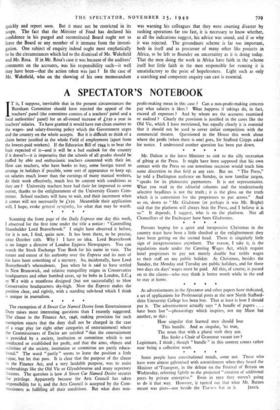The exemption of A Street Car Named Desire from Entertainment
Duty raises more interesting questions than I recently suggested. The clause in the Finance Act, 1946, making provision for such exemption enacts that the duty shall not be charged in the case of a stage play (or eight other categories of entertainment) where the Commissioners of Excise are satisfied "that the entertainment Is provided by a society, institution or committee which is not conducted or established for profit, and that the aims, objects and activities of the society, institution or committee are partly educa- tional." The word " partly " seems to leave the position a little vague, but let that pass. It is clear that the purpose of the clause in the Finance Act, and a very laudable purpose, was to assist undertakings like the Old Vic or Glyndebourne and many repertory theatres. The question is how A Street Car Named Desire secures the privilege. Apparently because the Arts Council has taken responsibility for it, and the Arts Council is accepted by the Com- missioners as fulfilling all their conditions. But what does non-
profit-making mean in this case ? Can a non-profit-making concern pay what salaries it likes ? What happens if takings do, in fact, exceed all expenses ? And by whom arc the accounts examined or audited ? Clearly the provision is justified in the cases like the Old Vic, which I have mentioned, but equally clearly it is essential that it should not be used to cover unfair competition with the commercial theatre. Questioned in the House this week about where the profit (when there is one) goes, Sir Stafford Cripps asked for notice. I understand another question has been put down.






































 Previous page
Previous page